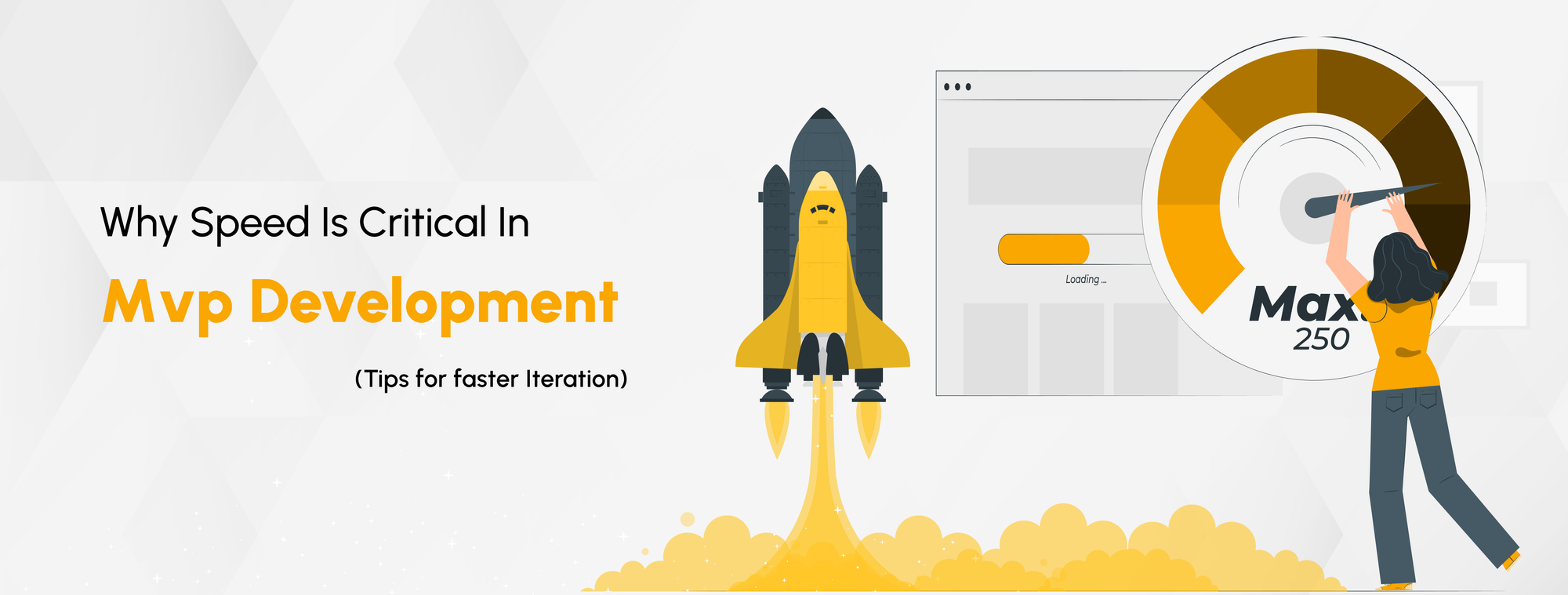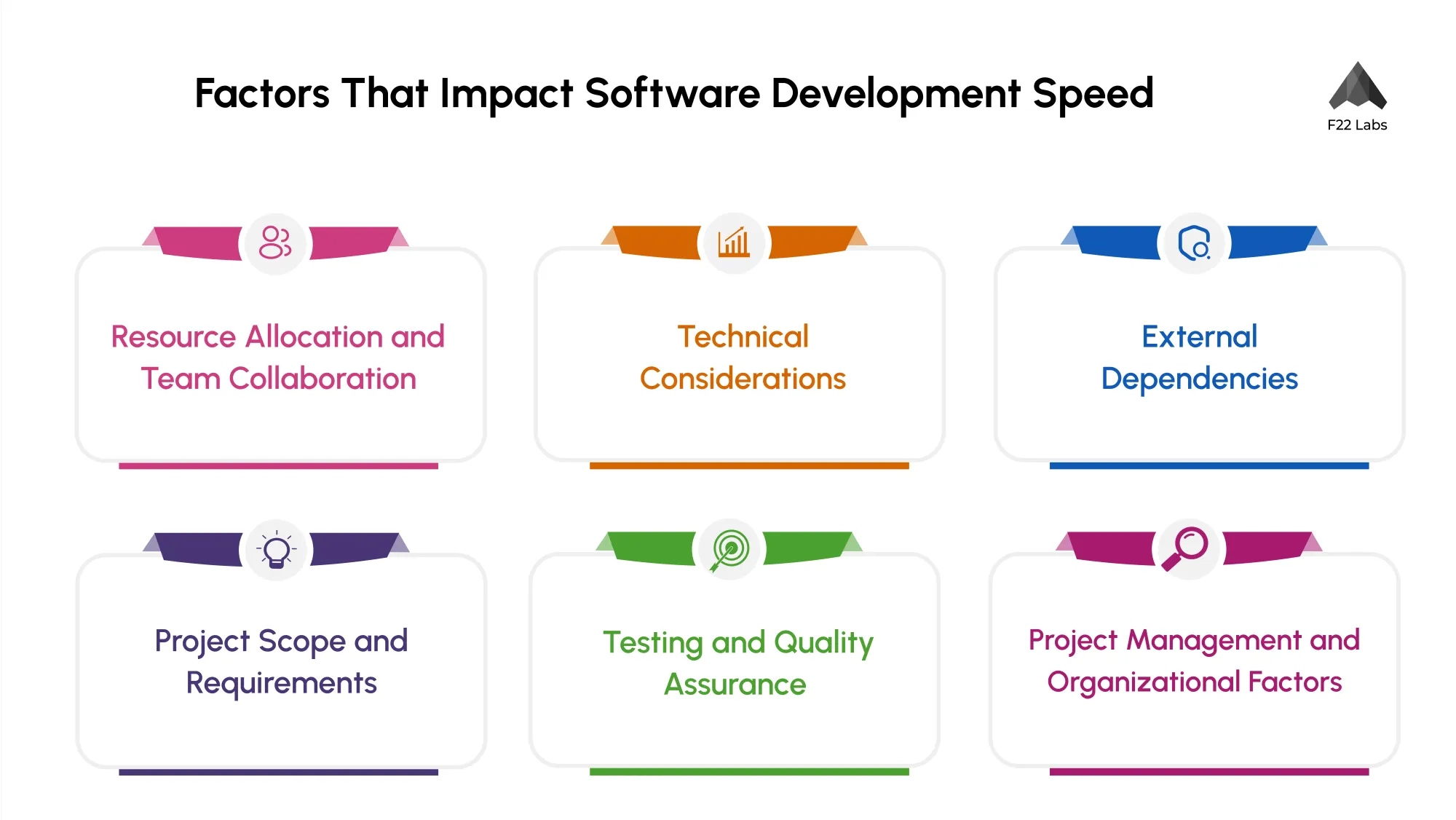Why Speed is Critical in MVP Development?

Have you ever heard the expression, "Slow and steady wins the race?"
In the arena of MVP (Minimum Viable Product) development, this saying doesn't quite hit the mark. Indeed, MVP development is a race, but speed plays a crucial role.
Speed in MVP development isn't just a bonus; it's a necessity.
Businesses today operate in a rapidly evolving landscape where consumer preferences shift like quicksilver and competition is fierce. Delaying product launches can mean losing the market opportunity entirely.
According to a study by McKinsey & Company, businesses that have accelerated their MVP development process are 1.5 times more likely to exceed their business goals compared to their slower counterparts. These numbers underscore the importance of MVP Development Speed - it's the driving force behind the success of many businesses.
Time to Market (TTM)
Time to Market (TTM) is a critical aspect of MVP Development Speed. The faster a business can move from an idea to a product in the hands of customers, the better. It's about getting a lead in the race and sustaining it.
| Company A | Company B | |
|---|---|---|
| Development Time | 9 months | 4 months |
| Market Entry | Lateral Entry | Earlier Entry |
| Market Share | Struggling to gain market share upon entry | Captured a substantial share upon early entry |
| Feedback Cycle Start | Starts later after the product launch | Starts early after product launch |
| Product Improvement | Delayed due to later feedback cycle start | Ongoing, thanks to the earlier feedback cycle start |
| Market Position | Attempting to catch up | Strong position with continual product improvement |
This example illustrates why speed is of the essence in MVP development. It's not just about how quickly a product is developed and launched; it's about how that speed impacts market entry, feedback cycles, product improvement, and ultimately, market position.
This is the advantage of a fast Time to Market (TTM) and why MVP development speed is so crucial.
Let's take the example of an MVP development agency providing MVP development services. By getting a product out faster, they can gather customer feedback, make necessary adjustments, and re-release the improved product. The sooner this feedback loop starts, the more chances they have to refine their product and outpace competitors.
Importance of Speed in MVP Development
In the world of Minimum Viable Product (MVP) development, it's not enough to simply have a good idea; the rate at which you can bring that idea to life is equally, if not more, critical.
The essence of MVP Development Speed is the ability to swiftly progress from concept to market-ready product. This speed allows businesses to rapidly validate assumptions, test market reception, and swiftly iterate to refine their offerings.
Capturing Market Opportunities
The market doesn't wait for anyone.
Just as seasons change, consumer needs and preferences evolve, creating fleeting opportunities for businesses to tap into. Here's where the MVP Development Process comes into play. The faster a company can recognize these opportunities and release a product to address them, the higher the chances they have to succeed.
MVP Development Speed enables companies to seize these windows of opportunity before they close.

The comparative tale of Company A and Company B underlines the criticality of Time to Market (TTM) in the world of MVP development. The speed at which an MVP Development Company can translate an idea into a market-ready product can significantly impact its market positioning, the initiation of the feedback loop, and overall competitive advantage.
As the business adage goes, "The early bird catches the worm" and in MVP development, the swift captures a greater share of the market.
Faster TTM has numerous benefits, but the most notable one is the early feedback loop. The sooner a product is in the hands of users, the quicker a company can collect and analyze feedback.
This allows MVP development services to swiftly refine their product, align it more closely with user needs, and re-launch an improved version. Moreover, an early launch means an early start to revenue generation.
Iterative Development Process
One of the key elements of MVP development speed is the iterative development process. The process involves releasing a viable product, receiving feedback, making improvements, and releasing the improved product.
The speedier this cycle, the more iterations a product goes through, and the better it becomes.
Sprint vs. Marathon Analogy
In MVP development, the race is more of a series of sprints rather than a marathon. You sprint to release your MVP, you pause to gather and analyze feedback, then you sprint again to make improvements. This cycle continues until you have a product that perfectly meets market needs.
How Speed Helps In Achieving Faster Iterations
The faster you launch your MVP, the sooner you initiate the feedback loop, allowing for quicker iterations. Speed in this context is not about rushing through development but efficiently navigating the cycle of release, feedback, improvement, and re-release.
Benefits Of Rapid Iterations for MVP Improvement
- Faster feedback loop for quick validation and adjustments.
- Improved product-market fit through continuous user feedback.
- Reduced development time and costs by identifying issues early on.
- Increased agility to respond to market dynamics and user demands.
- Enhanced adaptability by iterating and learning from each iteration.
Remember, the tortoise may have won the race, but in the world of MVP development, it's the hare that often comes out on top.
Strategies to Supercharge Time to Market
In the quest for rapid MVP development, the approach taken is as crucial as the destination. By strategizing to supercharge the Time to Market, startups ensure they're not just speeding - they're speeding smartly.
So, as startups race against the clock, these strategies work as their secret weapon, supercharging their journey and leading them toward triumph.
Efficient Project Planning And Management
Project planning and management are the lifeblood of the MVP Development Process. Let's envision a fintech startup about to develop its MVP. Before a single line of code comes into existence, they need to design a roadmap, an overarching strategy with precise milestones and realistic deadlines.
Now, imagine this roadmap as a GPS, guiding the startup through the dense forest of development. Each milestone is a landmark, a beacon showing them they're on the right path. And the MVP Development Speed? That's the pace at which they're moving, determined by how efficiently they follow this GPS.
How can they maintain a brisk pace? Agile methodologies come into play here. These methodologies, like a high-performance engine, fuel the speed, breaking development into smaller "sprints".
Picture this: The startup is focusing on creating a secure login feature for their fintech app. They dedicate a sprint for this, develop, test, and perfect it, before moving on to the next sprint. This iterative approach enables faster, more efficient cycles of development.
Streamlining The Development Process
Streamlining the MVP Development Process is akin to crafting a beautiful sculpture. It starts with a block of marble, which is then chipped away, bit by bit until a masterpiece emerges.
This masterpiece is the startup's Minimum Viable Product and the chisel. That's the strategy of breaking tasks into smaller, more manageable chunks.
As the fintech startup chips away at their tasks, like crafting the user interface, integrating payment gateways, or fortifying security measures, their MVP begins to take form. Speed is maintained as they focus on one detail at a time, just as a sculptor does when creating a masterpiece.
Rapid prototyping techniques then come into play, allowing the startup to hold up a mirror to their masterpiece, reflecting the users' perspectives. They create a simplified version of their product, test it with users, gather feedback, and fine-tune their MVP.
This validation process is quick and efficient, turbocharging the MVP Development Speed.
Automation And Tooling
Automation is the secret ingredient in boosting MVP development speed. It's the magic spell that transforms time-consuming manual tasks into swift automatic procedures.
With automation tools handling tasks like code formatting and error checking, developers can focus more on core development tasks, increasing efficiency and pace.
Consider code libraries and frameworks as a treasure trove, filled with pre-built codes ready to be customized for specific needs. A fintech startup can use frameworks like React Native for mobile app development. It's like using a template, accelerating the process, and saving valuable time.
Now, the last lap in the race to enhance speed is implementing efficient testing and deployment practices. Practices like Continuous Integration and Continuous Deployment (CI/CD) act as quality checkpoints, ensuring the code is ready for deployment, reducing errors, and eliminating potential delays.
Prioritizing Key Features
In the rush to develop a feature-rich product, startups can sometimes lose sight of what's essential. The key to maintaining MVP development speed lies in identifying core features for the MVP and focusing on "must-have" functionalities.
It's like packing for a journey - packing only what's necessary ensures swift, smooth travel.
In the case of our fintech startup, key features might include a secure login, seamless transaction processing, and an intuitive user interface. By focusing on these core elements, they avoid potential detours and roadblocks that could delay their journey to the market.
Factors That Impact Software Development Speed
Speed is the lifeblood of software development, especially in the creation of a Minimum Viable Product (MVP). However, achieving the right pace isn't about pressing the accelerator to the floor; it's a fine balance of numerous factors.
Resource Allocation and Team Collaboration
In the grand symphony of the MVP Development Process, the team is the orchestra. Their expertise and collaboration determine the overall performance.
An MVP development Services should ensure they have skilled resources in place who can harmonize their talents to create an outstanding product.
97% of organizations believe project management is critical to business performance and organizational success. Hence, effective communication channels must exist amongst team members to ensure a smooth flow of information and seamless collaboration.
Technical Considerations
The complexity of the project requirements and the Tech Stack Selection can significantly impact the MVP development speed.
Just as a car's speed is influenced by the road's terrain, so too is the development speed influenced by the complexity of the project.
The choice of technology stack not only affects development speed but also impacts the overall budget of your App. A well-chosen tech stack can optimize both development time and costs, ensuring a balance between speed and financial efficiency.
An MVP Development Company must carefully select the tech stack, and the set of technologies used to build the app, which matches the project's requirements. A good tech stack enhances performance and speed, while a mismatch can lead to unnecessary slowdowns.
External Dependencies
The speedometer of the MVP Development Process can also be affected by external dependencies. These include integration with third-party systems or regulatory or compliance requirements.
Startups need to factor in these considerations during planning, as unexpected hitches can cause a considerable lag in development speed.
Integrating a fintech app with a third-party payment gateway might have its own set of requirements and procedures, potentially slowing down the MVP Development Speed.

Project Scope and Requirements
The journey towards Minimum Viable Product can be bumpy if the project scope keeps changing or if the requirements are ambiguous. 52% of projects experience scope creep, which often leads to delays.
A clear and well-defined scope, coupled with complete and unambiguous requirements, can act as a catalyst, accelerating the MVP development speed.
Testing and Quality Assurance
While maintaining speed is crucial, so too is ensuring that the product is high quality. Test planning and execution are vital to ensuring that the product is free from defects and performs as expected. However, manual testing can be time-consuming.
According to a report by the World Quality Report, test automation helps organizations increase test execution speed, expand test coverage, and find more defects. Test automation tools can significantly speed up this process, thereby accelerating MVP development.
Project Management and Organizational Factors
Finally, the MVP development speed can be significantly influenced by project management practices and organizational culture. Efficient planning, prioritization, and a culture that encourages communication and innovation can speed up the development process, ensuring a swift and efficient journey to a Minimum Viable Product.
The MVP development speed is a crucial measure of this strategic, balanced approach, where speed and quality harmonize to create a symphony of success.
How Long Does It Take to Develop an MVP?
To answer this question, let's turn our focus to F22 Labs, a company that has etched its mark in the realm of MVP development. Their streamlined processes and methodologies, refined over years of experience, set the standard for achieving optimal MVP Development Speed.
Engaging with F22 Labs means getting an all-encompassing suite of MVP Development Services. It all starts with meticulous planning and road mapping, a pivotal step that lays the groundwork for the entire MVP Development Process.
Design Support
Next, their team of expert designers steps in, providing design support that aims at crafting a user experience tailored to both the product functionality and the target audience's needs.
Product Development
The baton is then passed to the actual product development stage. Here, F22 Labs’ skilled developers use cutting-edge technology and agile methodologies to transform the design into a tangible, functional product.
Growth and Awareness
Their services don't stop at product development. F22 Labs also extends its expertise to marketing, helping startups in creating growth and awareness for their product in the target market.
Specialized Services for Accelerated Development
Among the services offered by F22 Labs, their MVP development, dedicated development team, SaaS development service, and headless E-Commerce development stand out. These specialized services follow a targeted, streamlined process that accelerates product development while maintaining a high standard of quality.
F22 Labs' Team
At the heart of F22 Labs' success is its team. The company's collaborative approach involves the client at every step of the way. Their experts, with their technical proficiency and strategic insight, ensure the journey from an idea to a market-ready product is both swift and smooth.
At F22 Labs, MVP Development Speed is more than a mere metric; it's a philosophy that resonates in every project they undertake, and every product they craft. Their approach exemplifies the harmony of speed, quality, and customer satisfaction, highlighting how the speed in MVP development can turbocharge startup success.
Speedy Success Stories: Accelerated Development Case Studies
Let's take a look at some real-world case studies, illuminating the powerful impact of speed in MVP development.
Buffer: Joel Gascoigne, the founder of Buffer, initially developed a simple landing page explaining what the Buffer app would do, and offering plans for future users. This allowed him to gauge interest in his idea without building a full product.
The interest he garnered was enough to encourage him to proceed with the full application. The speed of this MVP development process minimized upfront costs and gave him confidence in the viability of his idea.
Product Hunt: Ryan Hoover started Product Hunt as an MVP via a simple email list where he shared interesting new products with subscribers. The list gained traction, confirming the need for a platform that curates and shares new tech products.
Hoover then developed the full-fledged Product Hunt platform, which became a go-to resource for tech enthusiasts and was eventually acquired by AngelList.
These stories demonstrate how speed in MVP development and a commitment to learning and iterating from user feedback can lead to astonishing success, even for startups that begin with limited resources.
Fail Fast. Fail Cheap: The Mantra of MVP Development Speed
In the fast-paced world of startups, where fresh ideas spring up every minute and competition is fierce, speed isn't just a metric; it's a survival tool.
Let's remember the words of Reid Hoffman, LinkedIn co-founder:
"If you're not embarrassed by the first version of your product, you've launched too late."
This quote perfectly encapsulates the mantra of 'fail fast, fail cheap.' Don't be afraid of launching early, learning quickly, and iterating faster. In the dynamic realm of startups, speed is indeed the key to success. Embrace it with F22 Labs, and let your entrepreneurial journey soar.
F22 Labs, equipped with extensive experience and a team of experts, can guide you toward achieving optimal MVP Development Speed, ensuring your startup hits the ground running.
Consider taking the first step towards swift, efficient MVP development by availing a 1-hour free consultation with F22 Labs. Visit the F22 Labs' MVP Development Services and book your consultation today.
So, remember, it's not just speed for speed's sake, it's about maintaining a swift, steady, and strategic rhythm in the journey of MVP development, ensuring a captivating performance that hits all the right notes in the symphony of startup success.
